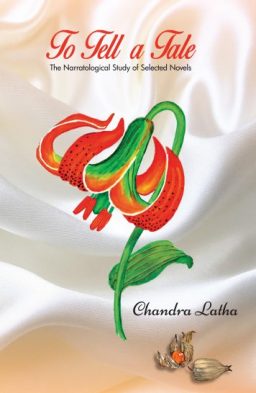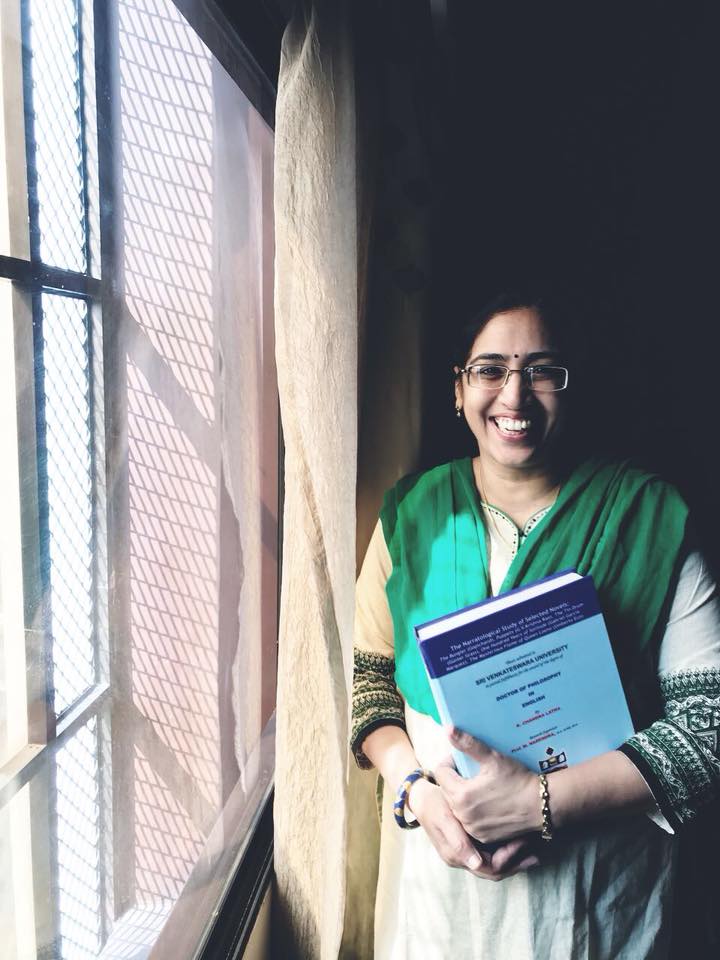
To tell a tale-8
-Chandra Latha
Chapter–II
Falling From the Peak : The Bungler
Gopichand
“The Mind is its own place, and in itself
Can make Heaven of the Hell, a Hell of Heaven’’
Gopichand was a multi-faceted genius, Short Story Writer, Novelist, Playwright, Editor, Essayist, Cinema Script Writer, Cinema Director and Producer, Radio Playwright and Programmer. During his time and later, he was the most influential intellectual among the famous Tenali Trinity, the other two being Chakrapani and G.V. Krishna Rao. Chakrapani is a writer, translator and film director. G.V. Krishna Rao is a bi-lingual scholar, writer and his novel Puppets is one of the five novels chosen for the study. Gudipati Venkata Chalam and Kodavatiganti Kutumba Rao also hail from Tenali and they along with Gopichand are among the pioneers of Telugu Short Story.
Gopichand was born on 8 September 1910 in a small coastal village, Chouta Palli, Krishna District in Andhra Pradesh and was brought up in villages like Angalooru, Ramapuram and Tenali, Guntur District. He was the son of renowned social reformer, Tripuraneni Ramaswamy who was also a Philanthrophist, a poet, a versatile genius and a lawyer. Ramaswamy was honorably called as Kavi Raju (King of Poets), for his proficiency in poetry and literary merits. Ramaswamy encouraged questioning the rigid ideas existing in the social and cultural practices and tried to redefine them through his literature and activism. His house, called Suthasramam (Abode of a non- Brahmin Sage Sutha Maharshi), was a Center for cultural and social reforms in Tenali. It became centre for philosophical and political intellectuals and scholars with diverse ideologies. It was a major formative influences on Gopichand. He was married in 1932. His wife Sakuntala Devi completed her Vidwan (Hindi Course) at Sarada Niketan. Gopichand dedicated one of his anthologies of stories to her.
Gopichand completed his graduation in Law in 1937 and started his practice at Tenali in 1939. But he quit his law practice soon and began his carrier as writer and Film Director in Chennai (then, Madras). He joined government services in 1953 as the Director, All India Radio, and was in the service till he breathed his last on 2 November, 1962.
In a detailed prefatory note on short fiction, Chitta Jallu, Gopichand mentioned that he avidly read Anton Chekov, H.E.Bates (English Writer, 1905-1974), William Saroyan (American Daramatist & Author, 1908-1981), Alexander Pushkin (Russian Writer, 1799-1837), Maxim Gorky (Russian Novelist, 1868-1936), W.Somerset Maugham, Prem Chand, Sarat Chandra Chatopadhya, George Bernard Shaw ( English Writer 1874-1965), O. Henry (American Writer, 1862 – 1910), Guy De Maupassant (French Writer, 1850-1893) and Pearl S. Buck (American Chinese Novelist, 1892-1973)
Gopichand studied the philosophers like Karl Marx (German Philosopher, Economist, 1818-1883), Friedrich Engels (German, Social Scientist 1820-1895), Sigmond Freud (Austrian Neurologist, 1856-1939) Alfred W.Adler (Austrian, Psychotherapist, 1870-1937), Immanuel Kant (German Philosopher, 1724-1804), Bertrand Russell (British Philosopher, 1872-1970) and Jean-Paul Sartre (French philosopher, novelist 1905-1980). He was very fond of “Russian and Chinese literature” as he could easily identify himself with their culture. He studied Indian Philosophers and Writers like Ravindra Nath Tagore (Indian Poet, Novelist, 1861-1941) and Sri Aurobindo (Indian Nationalist, Philosopher and Poet. 1872 –1950). He considered Kanyashulkam (1892 Drama, Gurazada Appa Rao (1862 – 1915) and Mala palli (1942, Novel Unnava Lakṣmīnārāyaṇa, 1877-1958) as the most influential Telugu works of his contemporary times.
Gopichand was a modern writer who was always realistic in his quest for reason, cause and effect. Gopichand was inspired by M.N.Roy (1887-1954), a nationalist revolutionary, radical activist and political theorist and became the first state secretary of Radical Democratic Party (India) Andhra Pradesh. When most of Gopichand’s contemporary intellectuals were hardcore supports of left political views, Gopichand stood apart by questioning the limitations of the implementations of Marxist theories in Russia and China.
Gopichand published his first essay “sambuka vadha” in 1928, Andhra Christian College Magazine, Guntur, his first story “Olympius” in Andhra Bhoomi, in October, 1933, and his first Novel Parivaratanam in 1946. He published around 12 short story anthologies and as many as 12 novels and 12 plays. He wrote philosophical discourses, social satires, talks, letters and periodical essays. His contribution to cinema is equally important and he is acknowledged as a pioneer in the fields of story and dialogue writing and direction. He directed many movies and wrote stories and scripts to many Telugu movies.
Unlike his father Tripuraneni Ramswamy, who opted for the metrical poetry to express his ideas and thoughts, Gopichand experimented with diverse genres and wide variety narratives. Technical advances like radio and film opened up new demands in narrative and Gopichand was always open for such a change which was more intelligently and aesthetically expressed in a fresh outlook. In his dedication of the novel “Asamarthuni Jeevayatra “to his father he wrote, “to my father, who taught me to question “Why?” (Gopichand. The Bungler: A journey through life. Translated by DS Rao. Srishti Publishers. 2003. Introduction Pg. )
The Bungler is the first Telugu novel that focuses and challenges such an unilateral existence of competent individuals in an uniquely strong society. The Bungler is an English Translation of the Telugu Novel Asamarthuni Jeevayatra by Tripuraneni Gopichand. Written during 1945-46 shortly before the political decolonization of India and published in 1947, The Bungler reflects the life during the period of 1930-40’s set in a village in coastal Andhra Pradesh at a time of “personal despondency and national turmoil”. (The Bungler .Introduction Pg. ) The Bungler is considered the first psychological and psycho-analytic novel in Telugu.
The multiple narrative frames of The Bungler move from one character to the other, one thought to the other, one feeling to the other. Gopichand assimilates all forms, techniques, theories of the day and dovetails two serious themes, psychological and philosophical. He doesn’t follow any unity and expresses his uneasiness with framed structures.
Gopichand says, “Expression of life is the ultimate attraction. Any defined literary form is a fixed frame. Literary forms are born to express the life. Why should we give more validity than that? If we can get more benefit by moving beyond those frames, why shouldn’t we move the frame?” He also points out. “Few critics consider life as a text book of multiple tables. Life is never that simple and straight for me.” (Gopichand. Chitta Jallu. Fore word to Gopichand Kathalu. 1962. Alakananda prachuranalu. 2009. Foreword Pg.) The Bungler is a matrix of various narrative techniques that the novelist assimilated to make it a “severely simple style (The Bungler. Introduction Pg. ) narrative as it may appear in the first read, but, a montage of diverse narratives of philosophical debate, psychological condition and existential pursuit of an incompetent man.
Montage, a word that related to films, is “the technique of selecting, editing, and piecing together separate sections of film to form a continuous whole.” (The Bungler, Pg.15) It is a “technique of producing a new composite whole from fragments of pictures, text, or music.” (The Bungler, Pg.15) The narrative technique applied in the novel can be rightly identified with this technique of film making, a montage.
The Bungler is set in a place similar to the villages, which were then sheltering the home-coming of the urban educated, conflicted and confused young generation, caught between the rural life ,feudal system ,traditional values and the acquired culture of the urban or semi -urban life and the values of the neo- modernity. Its narrative reflects the despair seeded in the conflicted generation trying to define its own existence in the persistent challenge of the defining a new nation that is struggling to emerge from the wounds of the world wars.
The narrative begins casually like any other contemporary novel but slowly moves on to surrealistic, symbolist and modernist trends and, finally ends with the mystic traces of magical realism. The translation of the Telugu novel has a subtitle, A journey through life, which implies that it is a journey for both the writer and the reader.
The Story (Fabula) of the novel The Bungler deals with the journey of life of an incompetent man and its Plot (Syuzhet) relates the life of Sita Rama Rao who lack pragmatic thinking and how he couldn’t cope up with the reality of mundane life in his sojourn between his father’s death and his own.
Asamarthuni Jeevayatra, the original Telugu title of the novel is not easy to be translated into English. Asamarthudu means an incompetent person, an inefficient one, a misfit, a mis-manager, a bungler, a good–for–nothing fellow. D.S.Rao, the translator, explains in a lengthy foreword, after several attempts, how he could meet the philosophical overtones of the Telugu Title, Asamarthuni Jeevayatra by adding a sub title, A journey through the Life to the main title The Bungler.
The Bungler contains six chapters. In the first chapter, The Bungler, Sitarama Rao, is introduced as a well-educated, wealthy, feudal, generous and young landlord. His father passed away after advising him to maintain their family reputation. Having taken this promise to his heart, Sitarama Rao settled all the debts which his father had to repay including his maternal uncle’s huge debt of forty thousand rupees in exchange of ten acres land. A well wisher, old Ramayya advises Sitarama Rao to be prudent and not to take any action that will make him repent later. But, Sitarama Rao replies that all his lofty ideals of youth were given up when he married Indira. Life met him with all normal chores of family life with two children and his wife has three miscarriages. His generosity cast him all his properties and his father-in-law, a police man, fetches a job. One day, instead of writing the accounts, Sitarama Rao draws his father-in-law’s caricature in the office account book and consequently lost his job. He doesn’t try for another job and starts realizing how the world around him cheats and betrays him. He reflects his is anger on his father-in-law on his wife and children. He writes a song that urges to demolish Taj Mahal. He thinks that his head is like an ant hill. He does nothing but too many questions buzz in his head. “His life consisted of lying down, eyes shut, his body fully covered by a blanket.”
*****
(Contd..)

Chandra Latha, writer from Nellore won Telugu Association of North America award in 1997 for the novel “Regadi vittulu”. Her other novels are Vardhani(1995) and Vallu veellu paarijaataalu (2011). Her short fiction includes nearly 80 stories compiled in nenu nanna navutha (1996),Idam shareeram (2003) and vivarnam(2007). Her non-fiction are (Fish can fly!) ”vacche daretu(2010), itanala kadaku eeboothi boTlu(2010). And also published her blogposts in a book madata pejee(2010).
